|
Films have been banned for all manner of reasons, most of which any level-headed film devotee can at least understand even if they vehemently disagree with the decisions or the reasons. Take a morally tight little island like Britain, where films have been refused certification for years at a time for a whole string of reasons: the Lon Chaney version of The Phantom of the Opera because it was considered too violent; Sergei Eisenstein's masterpiece Battleship Potemkin for being Bolshevist Propaganda; iconic Marlon Brando biker movie The Wild One because it might encourage criminal and antisocial behaviour; and poor old Ed Wood's Glen or Glenda for the very reason that Wood made it in the first place, because it promoted a greater understanding of transgender men. It was to be a staggering 37 years before the BBFC thought that the British public was ready for that one. And don't get me started on the slew of films that ended up on the notorious Video Nasties list, which I've already covered in my review of Nucleus's glorious DVD release, Video Nasties: the Definitive Guide.
But that's Britain, a supposedly free and democratic country. What about Czechoslovakia under Communist rule in the 1960s? It's probably less surprising that many home-grown films there were subject to a ban. Site favourites that fell foul of the Czech authorities include Miloš Forman's The Fireman's Ball [Hoří, má panenko] (1967), Juraj Herz's The Cremator [Spalovač mrtvol] (1969), Jiří Menzel's Larks on a String [Skřivánci na niti] (1969) and Věra Chytilová's Fruit of Paradise [Ovoce stromů rajských jíme] (1970), all for primarily political or ideological reasons. For the most part, it's not what the films openly stated but what they inferred in their often potent subtext that so angered the country's suspect moral guardians, and for the filmmakers, the only way to make even remotely controversial statements was through allegory and discreetly smuggled messaging.
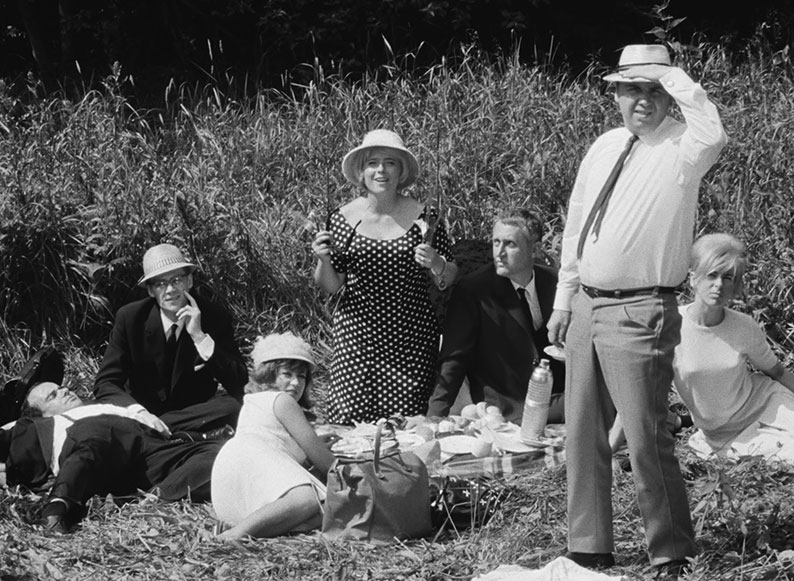
To a modern audience, particularly one unschooled in the conditions under which these films were made, it might be initially hard to understand what it was about these films that so riled the officials charged with overseeing such matters. A prime example is Jan Němec's 1966 The Party and the Guests [O slavnosti a hostech], a brief summary of which will likely give no indication of what eventually landed it on the government's "banned forever" list. Try this. A group of friends picnicking on a balmy summer's day are eventually transported to a well-attended riverside dinner party being hosted by wealthy and influential friend, a joint celebration to mark both his birthday and the wedding of two of the younger guests. That covers the bare basics. Anyone offended yet? I should probably go into more detail before asking that again.
There's certainly nothing to rankle the Czech censor in that opening picnic, as the members of the group eat and drink whilst lazing in the sun and engaging in largely non-specific small talk. As they get ready to depart, the women wander down to a nearby stream and strip down to their underwear to wash, something observed briefly by Josef (Jiří Němec), the only single man in a group consisting otherwise of three couples. It's a seemingly throwaway moment that reoccurs later in a manner that is open to a somewhat different reading. As the friends walk through the woodland, one of their number, Karel (Karel Mareš), is lagging behind when he is approached by Rudolph (Jan Klusák), an individual of odd appearance and behaviour who appears out of nowhere, and whose surface friendliness and inquisitiveness feels immediately discomforting, particularly when he takes Karel's arm and walks alongside him like a doting girlfriend. It's a particularly calculated form of intimidation, one designed to unsettle by invading personal space and that employs fake friendliness and familiarity to disconcert and ultimately incite fear over the propagator's true purpose, and to place him (it's usually a him) in a position of control through unwelcome and manipulative bodily contact. I'm assuming this registers even for viewers who have not experienced such behaviour, but as someone who has, I found myself twitching nervously as soon as Rudolph approaches Karel and takes his arm. Seconds later, the threat he represents is amplified by the emergence from the surrounding trees of several men that I would have no problem categorising as professional thugs, the largest of whom also links arms with Karel, a gesture of smiling mock affection that becomes one of forcible restraint when the rattled Karel attempts to break free. In no time at all, Rudolph and his henchmen have corralled the entire group in a nearby clearing, into which a desk and chair are then carried, meticulously placed, levelled up and tested for strength, and at which Rudolph, with his creepy lizard smile and his black-bound file containing who-knows-what? – then sits.
It is, of course, nigh-on impossible to divorce this sequence and the scene that follows from the time and place of its conception and birth, and it's this that elevates this portion of the film from troubling to genuinely frightening, particularly for anyone seeing it for the first time without knowledge of how things subsequently play out. If that includes you, I'd seriously give the next part of this review a miss and hop to the final paragraph (click here to do so automatically) , or skip the rest entirely for now and just get your hands on this excellent disc.
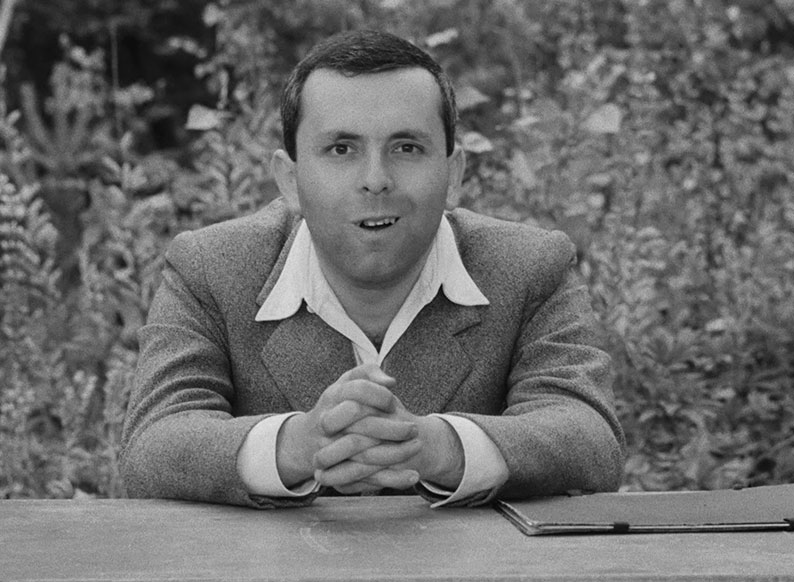
If Rudolph's appearance is immediately discomforting, once he's joined by his henchman the implication is clear, that he is an official in the Secret Police and the friends are being targeted to answer for some unspecified crime, or maybe even one of the twisted Rudolph's invention. It's a fear of the consequences of resistance – something that would presumably have been common knowledge to Czech citizens of the day – that sees the friends so willingly cooperate with all of Rudolph's most unreasonable commands. This extends to remaining inside a symbolic room that the lead henchman draws round them by dragging his heel in the dirt, with a (locked) doorway marked by the placement of two stones. As a representation of a possible reality, it's an increasingly tense sequence because, absurd though the situation may seem, it's worryingly easy to imagine that an official such as Rudolph might indeed play such games with his captives in order to disorientate and possibly even frighten them into revealing whatever information he and his goons are seeking. Or is he? A few increasingly uncomfortable minutes later, during which Karel attempts to leave and is grabbed and roughed up by the goons, this peculiar interrogation is broken up by the arrival of a well-dressed man (Ivan Vyskočil), who berates Rudolph for his behaviour, then reveals that the boy is his newly adopted son and that he was sent to bring the group to the above-mentioned dinner party. The superficially contrite Rudolph responds by dusting Karel's clothing down and insisting that the whole thing was a game.
So what was really going on here? Now we're getting to the crux of what apparently had Communist Party First Secretary Antonín Novotny leaping up and down with fury and demanding that the film be banned and that director Jan Němec be prevented from making any more films for the studio. Both, it should be noted, came to pass. While this intimidation scene works as a piece of wind-up drama, it's what it says about the sort of system under which people like Němec and master screenwriter Ester Krumbachová lived, and the complicity of those who inadvertently helped to enable it, that its true power lies. This also makes it chilling viewing even once you become aware that the whole thing is indeed 'a game'. Rudolph and his henchmen are indeed symbolic of the Secret Police, but it's clear that these allegorical elements are not specific to 1960s Czechoslovakia under Communist rule, but applicable to any system in which the government represses the rights of its citizens.
Compelling though this sequence is as surrealism-tinged drama, it's the behaviour of the seven friends that proves the most telling. A range of personalities is represented here, each of them symbolic of one aspect of society at large, but three in particular stand out. From the start, it's the unmarried Josef who emerges as the spokesman for the group, even helping to organise them by gender when they have been apprehended, a move that earns the head goon's seal of approval. By stepping forward to try and bargain with Rudolph, he also inadvertently separates himself from his comrades and finds himself outside of the symbolic room once it is drawn. As he continues to converse with his nominal captor, he becomes the collaborator, the citizen in an oppressed society who finds a way to potentially advantage himself, a process that also requires him to distance himself from his friends and family. Karel, on the other hand, by showing open contempt for Rudolph's authority and refusing to play along, represents those who fail to take the threat seriously, only to learn the hard way about the consequences of speaking out and disobedience in an authoritarian state. Most subtle at this stage, but most significant later, is the downcast and unnamed Husband (Evald Schorm), who by saying almost nothing and refusing to take part in the subsequent dinner party, where this group of societal representatives is considerably expanded, becomes the sole dissident in an otherwise overly obedient group.
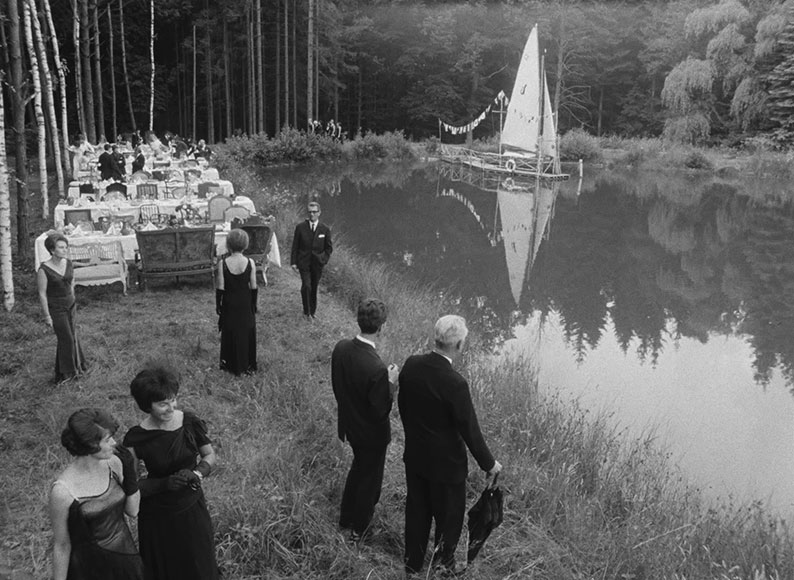
These themes are developed further at the riverside dinner party, where the guests all take their allotted seats and the newly promoted Josef is invited to join the Host and his almost childlike adult stepson at the presidential table. Here, Josef ingratiates himself further with his leader and even delivers an appreciative speech, while the Host announces that he will replace personal items lost by Karel when he was roughed up by Rudolph's men, a calculated show of benevolence that draws appreciative applause from his compliant subjects. By this point, I was seeing secondary meaning in almost every aspect of what was unfolding, and it's clear from subsequent statements made by Krumbachová and Němec that much, if not all, of this was intended, and it certainly didn't escape the attention of those who called for the film to be banned. Thus, when the Husband disappears, it confirms his status as the only dissident in this otherwise pacified society, though when this is first revealed, my first reaction was to wonder if he really has left for home as his Wife (Jana Prachařová) claims, or has been quietly and forcibly removed by an as-yet unseen new representation of the Secret Police. A short while later, when the Wife discovers that she's in not in her designated seat and everyone else has a similar realisation, it triggers a comically mayhemic game of musical chairs that infuriates the Host, who is outraged by this sudden breakdown of his carefully crafted social order. Similarly, when the Wife questions why there is no chair for her departed husband if he was, as is claimed, expected to attend, it suggests an unforgiveable administrative error that sends the dutiful Rudolph on a quest to locate the missing item of furniture, and when he can't locate it, he effectively fakes a solution to draw a line under the problem. I also read plenty into a brief shot of Josef as he looks over at a waitress as she lifts skirt to adjust her stocking. This echoes the earlier cutaway of him glancing at the wives of his friends in a state of partial undress, but in that shot the suggestion is of a single man quietly longing for something he can't have (he admits to Rudolph in the woodland interrogation that he is not good at approaching women), whereas in the later one he has moved up the political ladder and has taken to eyeing the service staff, over whom he may soon have a degree of power. His new status at the party is cemented when Rudolph hands him his rifle to look after – symbolically promoting him to the head of the government militia – while he accompanies his stepfather and the rest of the guests on a mission that is loaded with secondary meaning. This climaxes in a subtextually chilling final shot whose metaphoric power all lies in its suggestive use of sound.
It may seem like I've gone a bit overboard in my deconstruction of the film's potent subtext, but I really could continue in the same vein for some time, and most of what I've talked about above and a good deal more is also discussed by others in more detail in the special features. Technically and artistically, The Party and the Guests is a meticulously designed and constructed work, in the structural precision and layered dialogue of the screenplay, in the shot and editing choices of its handling, and in the painterly wides and searching close-ups of Jaromír Šofr's monochrome cinematography. Equally impressive are the performances of a cast made up exclusively of director Němec's friends, fellow intellectuals and artists who were apparently chosen by Němec and Krumbachová to play characters that reflected aspects of their true personalities. Quite what that says about composer Jan Klusák (whose work includes film scores for Jaromil Jireš' superb Valerie and Her Week of Wonders, as well as Dimensions of Dialogue and The Fall of the House of Usher for site favourite, Jan Švankmajer) and his riveting but deeply unsettling portrayal of Rudolph is anybody's guess.
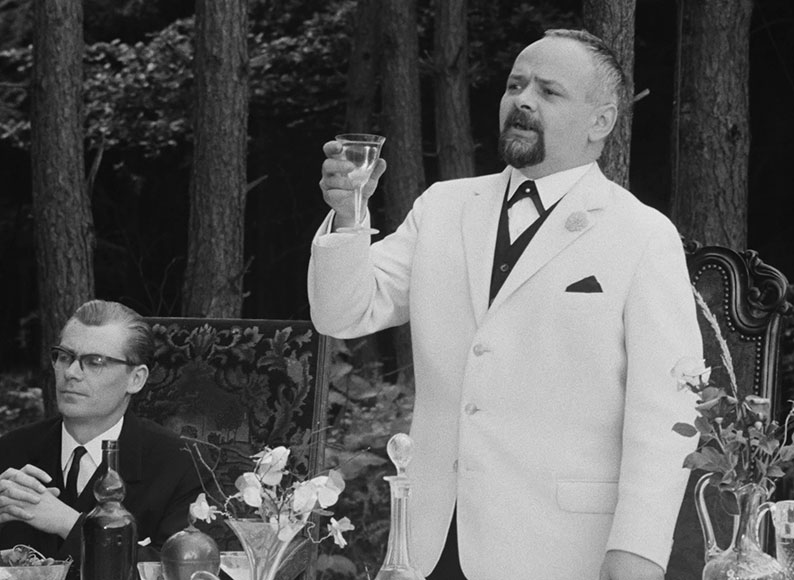
There is more than a touch of Luis Buñuel to the film's absurdist humour and the manner in which some scenes play out, and as the learned contributors to the special features on this disc have pointed out, there are also detectable whiffs of Antonioni, Kafka, Brecht and the compositions of painters such as Renoir and Goya. It'll freely admit that if all the subtext and symbolism somehow flies over your head, then it's quite possible that The Party and the Guests – whose American title is the perhaps too suggestive A Report on the Party and the Guests – will seem like a well-made, well-acted film about very little of consequence. But appreciate the film for what even the Czech authorities of the day clearly could see was going on beneath that polished surface, and it's easy to see why this extraordinary and richly layered work is regularly cited as one of the finest films of the Czech New Wave.
Sourced from a new 4K restoration by the Czech National Film Archive from the original negative, the 1080p transfer on Second Run's Blu-ray – the world Blu-ray premiere for Němec's film, no less – is framed in it's original 1.37:1 aspect ratio and looks terrific. The contrast for the most part feels absolutely spot-on, nailing the black levels and never overexposing the highlights (the Host's white suit is always nicely rendered) and boasting a generous tonal range between the two. Detail is cleanly and crisply rendered, something most evident in the film's telling facial close-ups, and all any traces of damage and dirt have been carefully removed.
The Linear PCM 1.0 mono soundtrack has also been restored, and although displaying the expected restrictions in the dynamic range, the dialogue is clear and the music especially so, and there is no background crackle or damage or hiss to contend with.
Optional English subtitles kick in by default.
Audio commentary by author Jonathan Owen
If you're looking for a deep dive into the film, its background, its symbolism, its socio-political substructure, and the controversies that hit it once it was complete, author Jonathan Owen is definitely your man. Here, he deconstructs almost every aspect of the film in such detail that it makes my observations above feels lightweight and woefully incomplete by comparison. Areas covered include the empty nature of language, director Němec's affinity with Buñuel and Renoir, selecting people to play characters whose personalities they mirrored in some way, the carefully composed wide shots used for scene transitions, the accidental resemblance of the Host to Lenin (this really got up the noses of the ruling authorities), and so much more. He reveals that the beating up of Karel by Rudolph's goons was inspired by a scene in a documentary about Vietnam, and in my favourite observation, he describes Rudolph as "a weird hybrid of Peter Lorre and Jerry Lewis." A hugely informative and enthralling companion to the film.
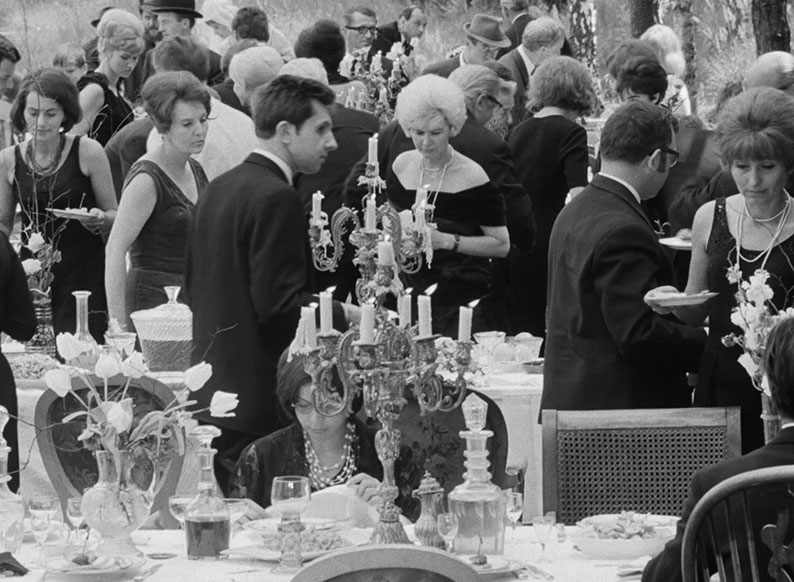
Projection Booth audio commentary with film historians Mike White, Samm Deighan and Kat Ellinger
Although there is some inevitable crossover with Jonathan Owen's detailed observations on the film, this second commentary by the above-named film historians is still an absolute must, being an openly enthusiastic – but equally perceptive – alternative to Owen's more scholarly reading of the film. Unsurprisingly, it's Kat Ellinger who leads the way and does most of the talking, and while there are a few too many examples of our old favourite "I love this [fill in blank]" for my liking, so much of what is said by all three is so acutely observed and so enjoyable to listen to that I'll happily let that slide. Links are highlighted to works of other filmmakers, particularly Buñuel's The Exterminating Angel and Renoir's The Rules of the Game, as well as writings by the likes of Franz Kafka, Albert Camus and Bertolt Brecht. There's also plenty of discussion on the film's socio-political subtext and how it remains scarily relevant today, some welcome information on screenwriter and set designer Ester Krumbachová, and Ellinger reveals that the film so terrified her on her first viewing that she had a nightmare about it.
Appreciation by Czechoslovak cinema specialist Peter Hames (12:40)
Kicking off by describing the film as one that gets talked about but that very few have seen, widely respected Czech cinema specialist Peter Hames – whose writing on The Party and the Guests is quoted by others in the special features – provides a concise overview of the film, its banning, its content, and is social and political themes. As you might expect, there is a fair amount of crossover with the commentaries here, but for me, this is the perfect starting point for analysis of the film, as much of the information and observations here are expanded and built on in the commentary tracks.
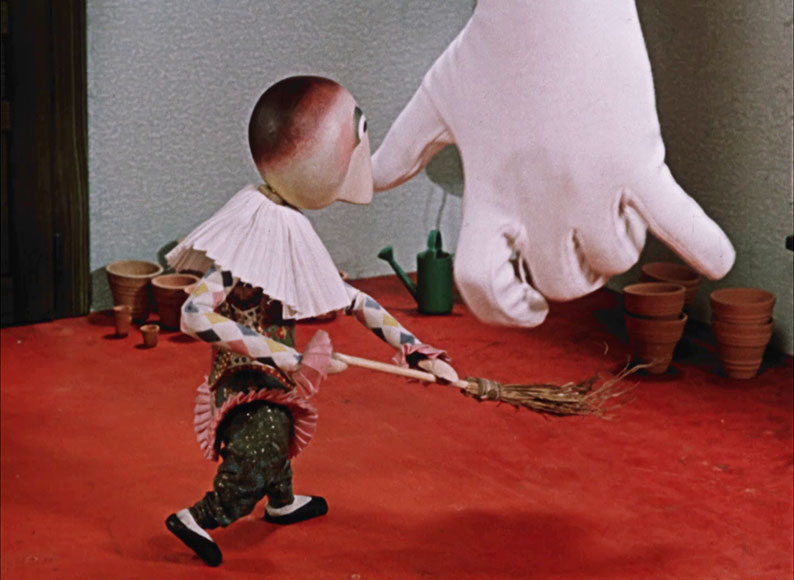
The Hand (Ruka, 1965) (18:35)
The final film from acclaimed illustrator and animator Jiří Trnka revolves around a harlequin who makes pots in his small apartment to house the solitary plant that appears to be his only non-functional possession. One day, his domicile is invaded by a giant gloved hand that commands him to cease making pots and to instead shape his clay in the hand's image. The harlequin resists, and the hand thus employs a variety of methods – including coercion, bribery, threats, violence, and imprisonment – in an attempt to force the harlequin to comply. More overt in its political statements than The Party and the Guests, the film confronts the impossible restrictions that face by artists whilst working under the restrictions imposed by the Czech authorities of the day, the consequences of which are brought home by the sobering final scene. The Hand won prizes at three international film festivals, but on Trnka's death in 1969, it was – of course – banned for having the audacity to say out loud what so many silently knew to be true. The design and stop-motion animation are both superb, and the film is presented here for the first time on Blu-ray in a new HD restoration.
Booklet
Every bit as detailed as Jonathan Owen's commentary, and more so in some respects, is the compelling and substantial essay on the film and director Jan Němec by Eastern European cinema expert Michael Brooke that occupies almost all of this booklet. I particularly appreciated the breakdown of the true meaning of the title and how western translations are a key reason for the more commonly held interpretations of the film's subtext, but also found the extensive look at Němec's film career most useful, as there's a considerable amount here that is not covered by any of the on-disc extras. Once again, the work of venerable Peter Hames is acknowledged, and useful suggestions are made for further reading.
In common with so many other great allegorical works, The Party and the Guests engages in its character drama, but it's what lies beneath its carefully crafted surface that delivers the powerful blows. We may be distanced by the time and locale from the conditions under which the film was made and which at first it seems to be criticising, but as is pointed out more than once in the excellent special features, the points being made here have a far wider application and are definitely not specific to mid-60s Czech society. This Second Run Blu-ray represents a terrific release of a remarkable film and comes unreservedly recommended.
|